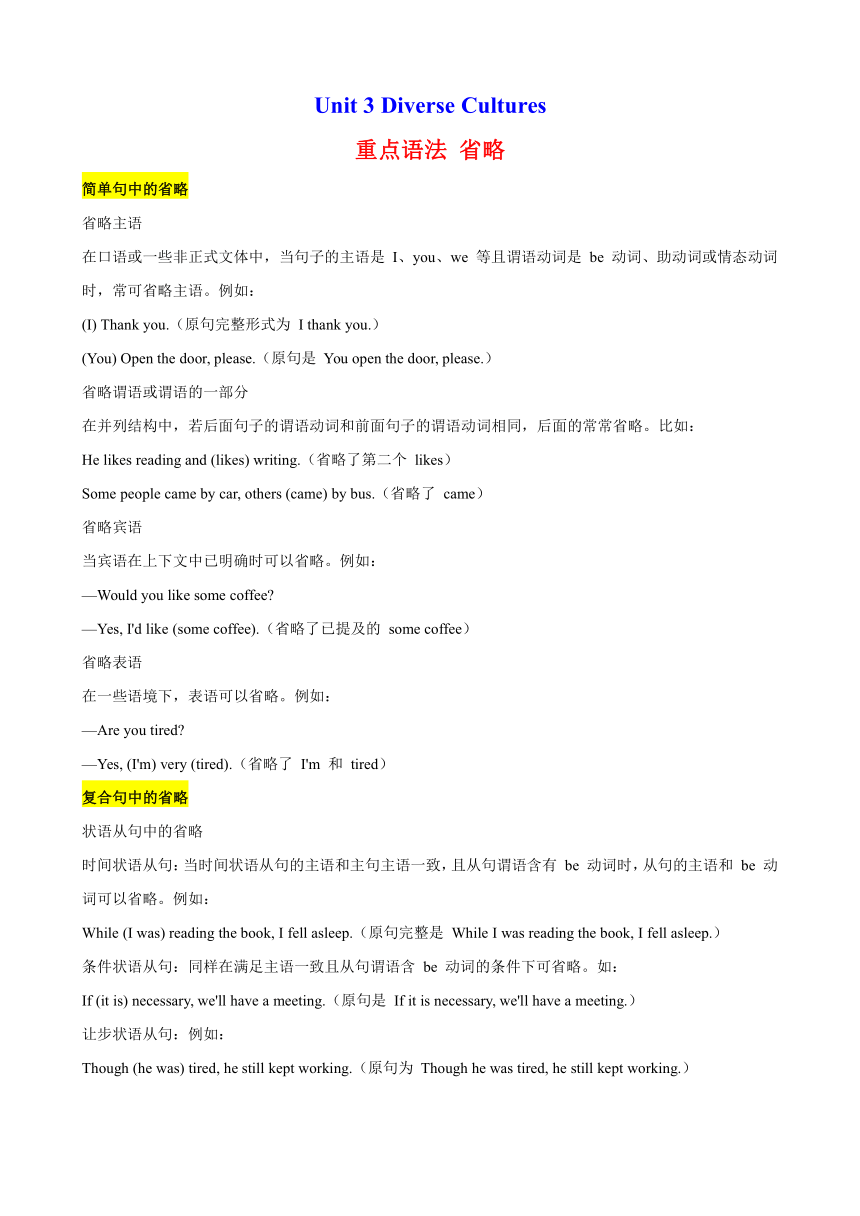
Unit 3 Diverse Cultures 重点语法 省略 简单句中的省略 省略主语 在口语或一些非正式文体中,当句子的主语是 I、you、we 等且谓语动词是 be 动词、助动词或情态动词时,常可省略主语。例如: (I) Thank you.(原句完整形式为 I thank you.) (You) Open the door, please.(原句是 You open the door, please.) 省略谓语或谓语的一部分 在并列结构中,若后面句子的谓语动词和前面句子的谓语动词相同,后面的常常省略。比如: He likes reading and (likes) writing.(省略了第二个 likes) Some people came by car, others (came) by bus.(省略了 came) 省略宾语 当宾语在上下文中已明确时可以省略。例如: —Would you like some coffee —Yes, I'd like (some coffee).(省略了已提及的 some coffee) 省略表语 在一些语境下,表语可以省略。例如: —Are you tired —Yes, (I'm) very (tired).(省略了 I'm 和 tired) 复合句中的省略 状语从句中的省略 时间状语从句:当时间状语从句的主语和主句主语一致,且从句谓语含有 be 动词时,从句的主语和 be 动词可以省略。例如: While (I was) reading the book, I fell asleep.(原句完整是 While I was reading the book, I fell asleep.) 条件状语从句:同样在满足主语一致且从句谓语含 be 动词的条件下可省略。如: If (it is) necessary, we'll have a meeting.(原句是 If it is necessary, we'll have a meeting.) 让步状语从句:例如: Though (he was) tired, he still kept working.(原句为 Though he was tired, he still kept working.) 定语从句中的省略 在限制性定语从句中,作宾语的关系代词 that、which、whom 常可省略。例如: The book (that) I bought yesterday is very interesting.(原句完整形式是 The book which I bought yesterday is very interesting.) 宾语从句中的省略 在一些语境下,宾语从句的引导词和后面的部分内容可以省略。例如: —Do you think (that) it will rain tomorrow (省略了 that) 不定式的省略 保留不定式符号 to 的省略 为了避免重复,不定式结构常省略后面的动词原形,只保留 to。比如: I asked him to go with me, but he didn't want to (go with me).(省略了 go with me) You don't have to explain it if you don't want to (explain it).(省略 explain it) 不定式符号 to 也省略的情况 在一些使役动词(如 make、let、have)和感官动词(如 see、hear、watch 等)后的不定式作宾语补足语时,不定式符号 to 要省略。例如: The teacher made him (stand) outside.(省略了 to,原句完整是 The teacher made him to stand outside.) I saw her (go) into the room.(省略 to) 其他省略情况 在对话中的省略 对话双方往往会省略一些彼此都知晓的内容,使交流更简洁。例如: —Where is the key —On the table.(省略了完整回答 It's on the table.) 在某些固定结构中的省略 像 no matter how (引导让步状语从句时后面常省略形容词后的名词等),例如: No matter how (hard the task is), we'll finish it on time.(省略了 the task is,原句完整可理解为 No matter how hard the task is, we'll finish it on time.) 一、语法填空 1.—How are you getting on with your work —Oh, I’m sorry. Things aren’t going well as (plan). 2.When (travel) in France, he picked up some French. 3.I will ask for your help necessary. 4.Unless (invite), I won’t go to the party. 5.They looked around the room as if (look) for something. 6.She is so shy that she never speaks first ... ...
~~ 您好,已阅读到文档的结尾了 ~~